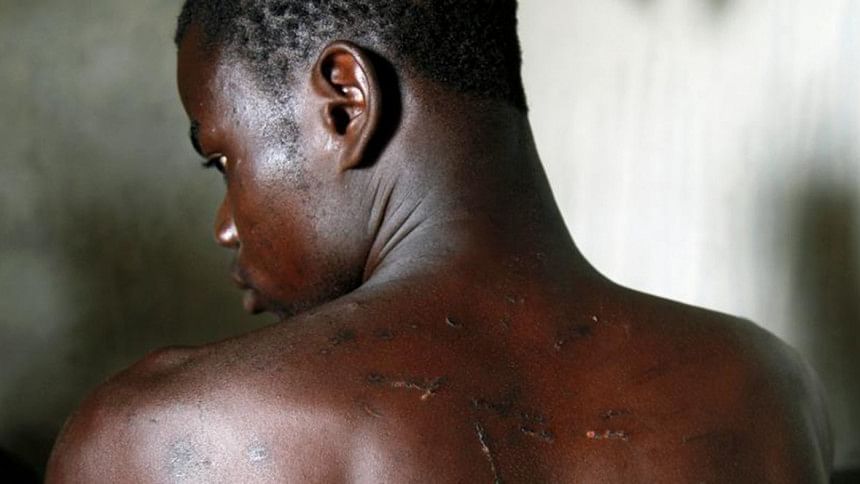Ivory Coast farmers face eviction, extortion in drive to save forests

Ivorian conservation agents are using the threat of eviction and prosecution to extort money from cocoa growers farming illegally in protected forest reserves, victims and rights groups say.
Around 80 percent of Ivory Coast's primary forest, once the largest in West Africa, has been chopped down in the five decades since independence, amid an agricultural expansion that helped make it the world's top cocoa producer and most important economy in Francophone West Africa.
With new illegal plantations coming into production every season, officials privately acknowledge that around a third of cocoa output, which reached a record 1.8 million tonnes last season, now originates from protected land.
President Alassane Ouattara, who took office in 2011, wants to reverse the loss. A 2014 forestry code seeks to restore forests to a fifth of its territory, up from 6 percent today.
But the conservation drive has been used as a pretext for abuse by some agents from forest management agency SODEFOR, claim victims, who say their illegal status in the protected forests means they have little hope of redress.
"Where am I going to file a complaint? Against whom? I'm afraid, because I'm in the forest illegally," cocoa farmer Bienvenu Bago said, his voice barely a whisper, his face bruised and shoulder bandaged.
Bago, who has for three years farmed illegally in western Ivory Coast's Cavally forest reserve, said forestry agents poured petrol on him and said they were going to set him alight.
He told Reuters he was then beaten, stripped and left naked on the road, the money he'd recently earned from his crop in their pockets. They struck a match, but only set fire to his clothes.
A technical adviser from SODEFOR, Aboa Dogui, rejected such abuse allegations, saying there was no evidence of malpractice by its agents but that reported abuses are investigated.
"We have nearly 1,000 agents at SODEFOR. We can't certify that every one is behaving well," Dogui told Reuters. "For the moment, we do not have information indicating bad behaviour."
Yet abuses like the attack on Bago are not isolated.
Human Rights Watch and Ivorian rights group RAIDH accuse SODEFOR agents of burning down the homes of illegal farmers, destroying their belongings, beating them and squeezing them for money in the Cavally, Goin-Débé and Scio forests.
"Until the Ivorian government conducts a full investigation into SODEFOR's management ... abuses in protected forests will continue," HRW Africa researcher Jim Wormington said.
The rights groups are not the first to accuse Ivorian officials of misconduct in their management of public land.
In March, a UN experts panel said such racketeering is widespread. Soldiers and park service agents earned some 1 billion CFA francs ($1.74 million) each year from illegal taxes collected from cocoa farmers in the Mont Peko National Park alone, it said.
Chaos among Ivory Coast farmers
Herve Keita, like thousands of farmers now occupying land in Ivory Coast's 231 protected forests, moved into the Cavally reserve amid the chaos that followed a brief 2011 civil war.
Keita had already paid SODEFOR agents once last year so they would leave him in peace on the plantation he'd carved out of the virgin forest. But he was still waiting for a buyer to pick up his main harvest when they returned in December.
Since he had no money to give them, the agents instead packed up the cocoa he had drying in the sun.
"They even cut the ripe pods off the trees," he told Reuters. "They loaded it all into the sacks and then they cut down the trees and set it all on fire."
SODEFOR agents are not meant to clear illegal plantations that are already in production but rather allow their output to decline naturally as reforestation is carried out.
Keita's plot smouldered for more than a week, the charred remains of birds and monkeys littering the forest floor. Six months on, the site remains a 20-hectare desolate scar in the middle of the jungle.
Still, Keita considers himself relatively lucky.
When Guetayoaba Ouedraogo was last seen alive in 2014, he had been stopped along with two other cocoa growers by forestry agents. After his decomposing body was later found in the forest, his family filed a complaint with local authorities, but they say the case has gone nowhere.
A second body was found weeks later. The third man in the group was never seen again.
SODEFOR's Dogui denied the forest agency had anything to do with the deaths, blaming them instead on infighting between rival groups present in the forest. He added that the agency opened an internal investigation as soon as it was made aware that its agents were accused of involvement. The inquest is ongoing, he said.
Bago remains undeterred by the beatings. He said he will return to the forest as soon as he can walk again.
"When I am better, I will go back to my plantation. I can't do anything else. I have to eat," he told Reuters.

 For all latest news, follow The Daily Star's Google News channel.
For all latest news, follow The Daily Star's Google News channel. 








Comments